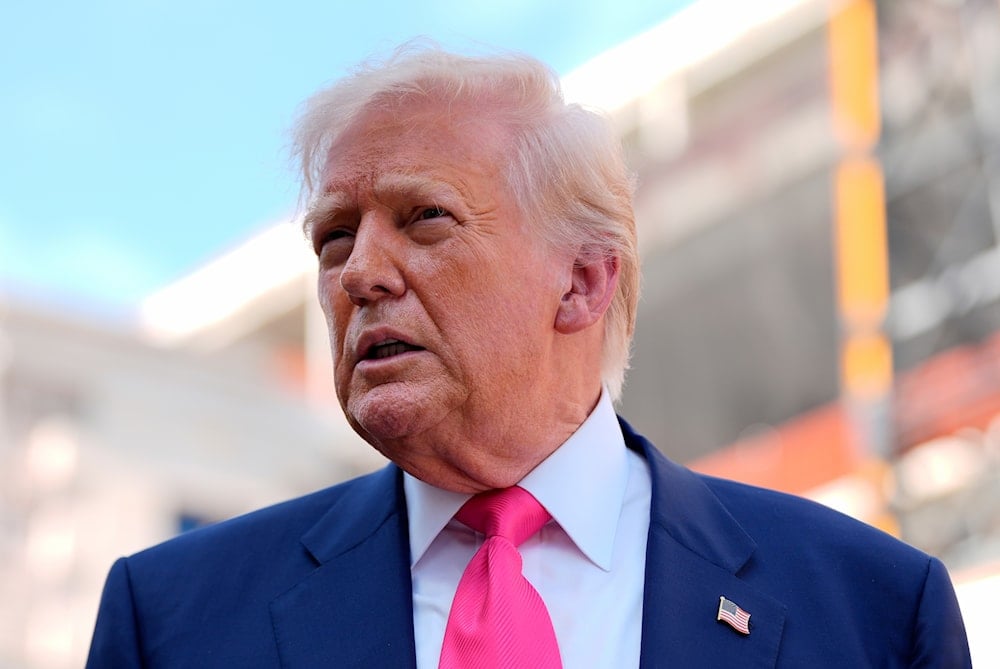Trump slaps 100% semiconductor tariffs, barring US-based manufacturers
Trump announces 100% semiconductor tariffs, sparing firms with US investments like Apple and TSMC.
-

US President Donald Trump visits the Federal Reserve on July 24, 2025, in Washington. (AP Photo/Julia Demaree Nikhinson)
US President Donald Trump announced plans to impose a 100% tariff on imported semiconductors, excluding companies that are either manufacturing in the US or have committed to doing so, Reuters reported on Wednesday. The initiative is part of a broader effort to bring high-tech manufacturing back to US soil.
Speaking from the Oval Office on Wednesday, Trump clarified that companies like Apple would be exempt from the new tariff. Apple has pledged to invest an additional $100 billion in the US, expanding its domestic production footprint.
"For companies like Apple, which have committed to build in the United States, there will be no charge," Trump told reporters. He also warned companies against reneging on such commitments. "If, for some reason, you say you're building and you don't build, then we go back and we add it up, it accumulates, and we charge you at a later date… that's a guarantee," he added.
While impactful, Trump’s comments did not amount to a formal policy announcement. The specifics of how these tariffs would be applied remain unclear.
Companies with significant US-based operations, such as Apple and Taiwan’s TSMC, are expected to avoid the proposed 100% import duty. TSMC operates manufacturing facilities in the US, which positions major clients like Nvidia to bypass additional tariff costs.
Read more: China summons chip giant Nvidia over alleged security risks
Global reactions
Trump’s remarks triggered swift international responses. South Korea’s trade envoy stated that chip giants Samsung Electronics and SK Hynix would not face the new tariffs, thanks to favorable terms under an existing trade agreement with Washington.
Japan confirmed that it would not face harsher tariff conditions than other nations. Meanwhile, the European Union reported an agreement with the US for a flat 15% tariff on most exports, including semiconductors, cars, and pharmaceuticals.
In Southeast Asia, industry figures voiced strong concerns. Dan Lachica, president of the Philippine semiconductor industry, warned that Trump’s plan could be "devastating" for his country’s exports.
In Malaysia, Trade Minister Tengku Zafrul Aziz cautioned that his country could lose access to a key market if its semiconductor products became less competitive under the proposed tariffs.
Market impact, industry response
Nvidia, a leader in artificial intelligence and graphics processing units, is planning to invest hundreds of billions of dollars in US-based chip production over the next four years. Though the company declined to comment on Trump’s announcement, its positioning within the US market is expected to mitigate the effects of the proposed tariff.
Brian Jacobsen, chief economist at Annex Wealth Management, remarked, "Large, cash-rich companies that can afford to build in America will be the ones to benefit the most. It's survival of the biggest."
Asian semiconductor firms with investments in the US experienced a boost in share prices. TSMC and Samsung rose 4.4% and 2% respectively. Silicon wafer producer GlobalWafers, which operates a Texas facility, saw its stock surge by 10%.
While Samsung and TSMC offered no comment on the announcement, GlobalWafers stated it has adopted cost-cutting measures to maintain its competitiveness amid policy uncertainty.
Economic implications
The Biden administration previously introduced a $52.7 billion subsidy program to support semiconductor manufacturing and research. As part of that initiative, the Commerce Department persuaded five leading-edge chipmakers to establish US-based factories.
Despite these efforts, US production accounted for only 12% of the global chip supply last year, down from 40% in 1990.
Martin Chorzempa of the Peterson Institute for International Economics noted, "There's so much serious investment in the United States in chip production that much of the sector will be exempt."
Chorzempa also pointed out that Chinese companies like SMIC and Huawei are unlikely to qualify for exemptions. However, since their chips are mostly embedded in devices assembled in China, a lack of corresponding component tariffs might limit the effectiveness of Trump’s proposed measures.
Read more: Huawei's chip breakthrough makes Apple in China vulnerable

 4 Min Read
4 Min Read








